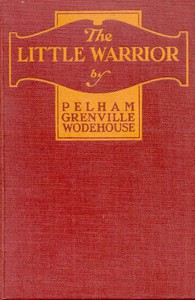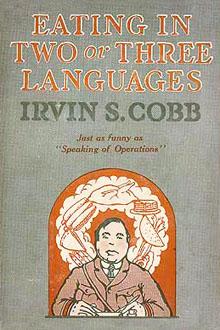The Little Warrior by P. G. Wodehouse (top 50 books to read txt) 📗

- Author: P. G. Wodehouse
Book online «The Little Warrior by P. G. Wodehouse (top 50 books to read txt) 📗». Author P. G. Wodehouse
“You know,” he said, stammering a little, for he found a sudden difficulty in controlling his voice. “You’re a dashed good sort!”
“I’m awfully glad you think so.”
There was a silence—as far, at least, as he and she were concerned. In the outer world, beyond the piece of scenery under whose shelter they stood, stirring things, loud and exciting things, seemed to be happening. Some sort of an argument appeared to be in progress. The rasping voice of Mr Goble was making itself heard from the unseen auditorium. These things they sensed vaguely, but they were too occupied with each other to ascertain details.
“What was the name of that place again?” asked Freddie. “The what-ho-something?”
“The Automat?”
“That’s the little chap! We’ll go there, shall we?”
“The food’s quite good. You go and help yourself out of slot-machines, you know.”
“My favorite indoor sport!” said Freddie with enthusiasm. “Hullo! What’s up? It sounds as if there were dirty work at the cross-roads!”
The voice of the assistant stage-manager was calling—sharply excited, agitation in every syllable.
“All the gentlemen of the chorus on the stage, please! Mr Goble wants all the chorus—gentlemen on the stage!”
“Well, cheerio for the present,” said Freddie. “I suppose I’d better look into this.” He made his way onto the stage.
§ 3.There is an insidious something about the atmosphere of a rehearsal of a musical play which saps the finer feelings of those connected with it. Softened by the gentle beauty of the Spring weather, Mr Goble had come to the Gotham Theatre that morning in an excellent temper, firmly intending to remain in an excellent temper all day. Five minutes of “The Rose of America” had sent him back to the normal: and at ten minutes past eleven he was chewing his cigar and glowering at the stage with all the sweetness gone from his soul. When Wally Mason arrived at a quarter past eleven and dropped into the seat beside him, the manager received him with a grunt and even omitted to offer him a cigar. And when a New York theatrical manager does that, it is a certain sign that his mood is of the worst.
One may find excuses for Mr Goble. “The Rose of America” would have tested the equanimity of a far more amiable man: and on Mr Goble what Otis Pilkington had called its delicate whimsicality jarred profoundly. He had been brought up in the lower-browed school of musical comedy, where you shelved the plot after the opening number and filled in the rest of the evening by bringing on the girls in a variety of exotic costumes, with some good vaudeville specialists to get the laughs. Mr Goble’s idea of a musical piece was something embracing trained seals, acrobats, and two or three teams of skilled buck-and-wing dancers, with nothing on the stage, from a tree to a lamp-shade, which could not suddenly turn into a chorus-girl. The austere legitimateness of “The Rose of America” gave him a pain in the neck. He loathed plot, and “The Rose of America” was all plot.
Why, then, had the earthy Mr. Goble consented to associate himself with the production of this intellectual play? Because he was subject, like all other New York managers, to intermittent spasms of the idea that the time is ripe for a revival of comic opera. Sometimes, lunching in his favorite corner in the Cosmopolis grill-room, he would lean across the table and beg some other manager to take it from him that the time was ripe for a revival of comic opera—or more cautiously, that pretty soon the time was going to be ripe for a revival of comic opera. And the other manager would nod his head and thoughtfully stroke his three chins and admit that, sure as God made little apples, the time was darned soon going to be ripe for a revival of comic opera. And then they would stuff themselves with rich food and light big cigars and brood meditatively.
With most managers these spasms, which may be compared to twinges of conscience, pass as quickly as they come, and they go back to coining money with rowdy musical comedies, quite contented. But Otis Pilkington, happening along with the script of “The Rose of America” and the cash to back it, had caught Mr Goble in the full grip of an attack, and all the arrangements had been made before the latter emerged from the influence. He now regretted his rash act.
“Say, listen,” he said to Wally, his gaze on the stage, his words proceeding from the corner of his mouth, “you’ve got to stick around with this show after it opens on the road. We’ll talk terms later. But we’ve got to get it right, don’t care what it costs. See?”
“You think it will need fixing?”
Mr Goble scowled at the unconscious artists, who were now going through a particularly arid stretch of dialogue.
“Fixing! It’s all wrong! It don’t add up right! You’ll have to rewrite it from end to end.”
“Well, I’ve got some ideas about it. I saw it played by amateurs last summer, you know. I could make a quick job of it, if you want me to. But will the author stand for it?”
Mr Goble allowed a belligerent eye to stray from the stage, and twisted it round in Wally’s direction.
“Say, listen! He’ll stand for anything I say. I’m the little guy that gives orders round here. I’m the big noise!”
As if in support of this statement he suddenly emitted a terrific bellow. The effect was magical. The refined and painstaking artists on the stage stopped as if they had been shot. The assistant stage-director bent sedulously over the footlights, which had now been turned up, shading his eyes with the prompt script.
“Take that over again!” shouted Mr Goble. “Yes, that speech about life being like a water-melon. It don’t sound to me as though it meant anything.” He cocked his cigar at an angle, and listened fiercely. He clapped his hands. The action stopped again. “Cut it!” said Mr Goble tersely.
“Cut the speech, Mr Goble?” queried the obsequious assistant stage-director.
“Yes. Cut it. It don’t mean nothing!”
Down the aisle, springing from a seat at the back, shimmered Mr Pilkington, wounded to the quick.
“Mr Goble! Mr Goble!”
“Well?”
“That is the best epigram in the play.”
“The best what?”
“Epigram. The best epigram in the play.”
Mr. Goble knocked the ash off his cigar. “The public don’t want epigrams. The public don’t like epigrams. I’ve been in the show business fifteen years, and I’m telling you! Epigrams give them a pain under the vest. All right, get on.”
Mr Pilkington fluttered agitatedly. This was his first experience of Mr Goble in the capacity of stage-director. It was the latter’s custom to leave the early rehearsals of the pieces with which he was connected to a subordinate producer, who did what Mr Goble called the breaking-in. This accomplished, he would appear in person, undo most of the other’s work, make cuts, tell the actors how to read their lines, and generally enjoy himself. Producing plays was Mr Goble’s hobby. He imagined himself to have a genius in that direction, and it was useless to try to induce him to alter any decision to which he might have come. He regarded those who did not agree with him with the lofty contempt of an Eastern despot.
Of this Mr Pilkington was not yet aware.
“But, Mr Goble … !”
The potentate swung irritably round on him.
“What is it? What is it? Can’t you see I’m busy?”
“That epigram …”
“It’s out!”
“But … !”
“It’s out!”
“Surely,” protested Mr Pilkington almost tearfully, “I have a voice …”
“Sure you have a voice,” retorted Mr Goble, “and you can use it any old place you want, except in my theatre. Have all the voice you like! Go round the corner and talk to yourself! Sing in your bath! But don’t come using it here, because I’m the little guy that does all the talking in this theatre! That fellow gets my goat,” he added complainingly to Wally, as Mr Pilkington withdrew like a foiled python. “He don’t know nothing about the show business, and he keeps butting in and making fool suggestions. He ought to be darned glad he’s getting his first play produced and not trying to teach me how to direct it.” He clapped his hands imperiously. The assistant stage-manager bent over the footlights. “What was that that guy said? Lord Finchley’s last speech. Take it again.”
The gentleman who was playing the part of Lord Finchley, an English character actor who specialized in London “nuts,” raised his eyebrows, annoyed. Like Mr Pilkington, he had never before come into contact with Mr Goble as stage-director, and, accustomed to the suaver methods of his native land, he was finding the experience trying. He had not yet recovered from the agony of having that water-melon line cut out of his part. It was the only good line, he considered, that he had. Any line that is cut out of an actor’s part is always the only good line he has.
“The speech about Omar Khayyam?” he enquired with suppressed irritation.
“I thought that was the way you said it. All wrong! It’s Omar of Khayyam.”
“I think you will find that Omar Khayyam is the—ah—generally accepted version of the poet’s name,” said the portrayer of Lord Finchley, adding beneath his breath. “You silly ass!”
“You say Omar of Khayyam,” bellowed Mr Goble. “Who’s running this show, anyway?”
“Just as you please.”
Mr Goble turned to Wally.
“These actors …” he began, when Mr Pilkington appeared again at his elbow.
“Mr Goble! Mr Goble!”
“What is it now?”
“Omar Khayyam was a Persian poet. His name was Khayyam.”
“That wasn’t the way I heard it,” said Mr Goble doggedly. “Did you?” he enquired of Wally. “I thought he was born at Khayyam.”
“You’re probably quite right,” said Wally, “but, if so, everybody else has been wrong for a good many years. It’s usually supposed that the gentleman’s name was Omar Khayyam. Khayyam, Omar J. Born 1050 A.D., educated privately and at Bagdad University. Represented Persia in the Olympic Games of 1072, winning the sitting high-jump and the egg-and-spoon race. The Khayyams were quite a well-known family in Bagdad, and there was a lot of talk when Omar, who was Mrs Khayyam’s pet son, took to drink and writing poetry. They had had it all fixed for him to go into his father’s date business.”
Mr Goble was impressed. He had a respect for Wally’s opinion, for Wally had written “Follow the Girl” and look what a knock-out that had been. He stopped the rehearsal again.
“Go back to that Khayyam speech!” he said, interrupting Lord Finchley in mid-sentence.
The actor whispered a hearty English oath beneath his breath. He had been up late last night, and, in spite of the fair weather, he was feeling a trifle on edge.
“‘In the words of Omar of Khayyam’…”
Mr Goble clapped his hands.
“Cut that ‘of,’” he said. “The show’s too long, anyway.”
And, having handled a delicate matter in masterly fashion, he leaned back in his chair and chewed the end off another cigar.
For some minutes after this the rehearsal proceeded smoothly. If Mr Goble did not enjoy the play, at least he made no criticisms except to Wally. To him he enlarged from time to time on the pain which “The Rose of America” caused him.
“How I ever came to put on junk like this beats me,” confessed Mr Goble frankly.
“You probably saw that there was a good idea at the back of it,” suggested Wally. “There is, you know. Properly handled, it’s an idea that could be made into a success.”
“What would you do with it?”
“Oh, a lot of things,” said Wally warily. In his younger and callower days he had sometimes been rash enough to scatter views on the reconstruction of plays broadcast, to find them gratefully absorbed and acted upon and treated as a friendly gift. His affection for Mr Goble was not so overpowering as to cause him to give him ideas for nothing now. “Any time you want me to fix it for you, I’ll come along. About one and a half per cent of the gross would meet the case, I think.”
Mr Goble faced him, registering the utmost astonishment and horror.
“One and a half per cent for fixing a show like this? Why, darn it, there’s hardly anything to do to it! It’s—it’s—in!”
“You called it junk just now.”
“Well, all I meant was that it wasn’t the sort of thing I cared for myself. The public will eat it! Take it from me, the time is just about ripe for a revival of comic opera.”
“This one will want all the reviving you can give it. Better use a pulmotor.”
“But that long boob,





Comments (0)